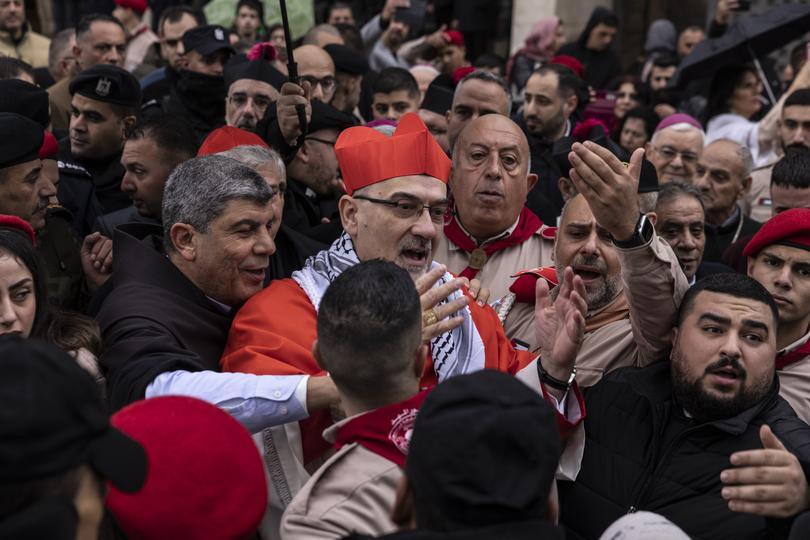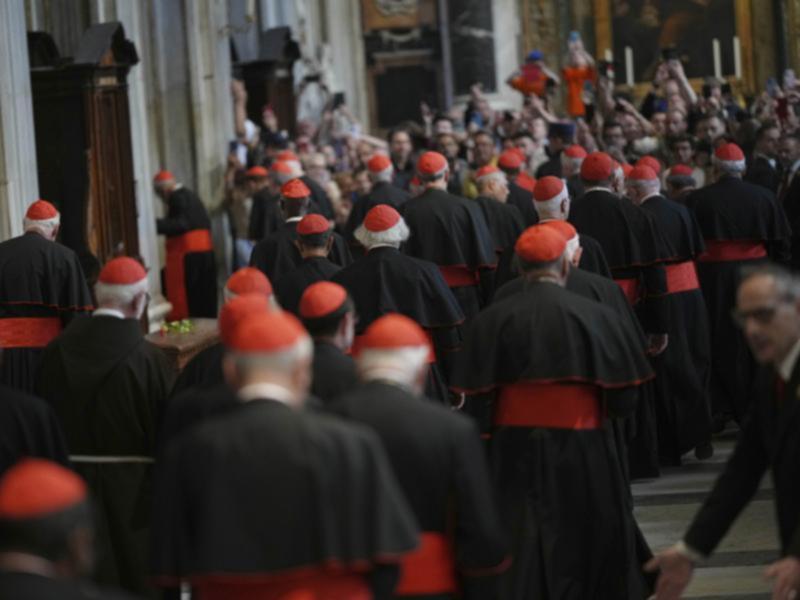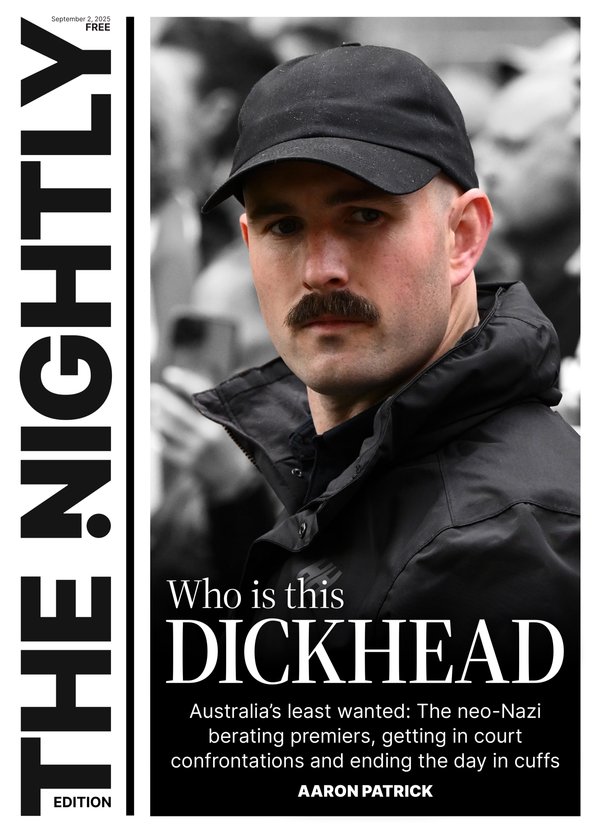As conclave nears, Italian cardinals emerge as frontrunners for Pope, but tradition could be tested

Ahead of the 2013 conclave to replace Pope Benedict XVI, Cardinal Angelo Scola of Milan was tipped to restore the Papal hat to an Italian. Italians got the next best thing in Pope Francis - the Argentine son of Italian immigrants. But many here wondered whether one of their own would ever again sit on the throne of St. Peter.
Now, some Italians are daring to dream again.
The Papal conclave that begins Wednesday remains unpredictable, with the largest and most diverse group of cardinals in church history set to elect the next leader of 1.4 billion Catholics.
Sign up to The Nightly's newsletters.
Get the first look at the digital newspaper, curated daily stories and breaking headlines delivered to your inbox.
By continuing you agree to our Terms and Privacy Policy.As the princes of the church prepare to seclude themselves in the Sistine Chapel, Italy has more cardinals talked about as top contenders than any other country, boosting the chances of a nation that birthed roughly 80 per cent of the 266 Popes, though none since 1978.
Italians, this time, are hopeful but guarded, knowing full well that a church growing fastest in the developing world may see another Italian Pope as an ill-advised step backward.
On the other hand, Italy has more voting cardinals than any other country, and its contenders, some seen as skilful diplomats, tick boxes that their international peers may see as vital in unstable times, when wars are raging in the Middle East and Europe, and nationalism is reawakening in the West.
It is often said that he who enters a conclave as Pope leaves a cardinal.
But Cardinal Pietro Parolin, the Vatican’s powerful secretary of state, and Cardinal Matteo Zuppi, Francis’s emissary to Russia and Ukraine as well as the archbishop of Bologna, nevertheless rank among the most talked-about contenders. Parolin is viewed as a moderate while Zuppi is seen as more progressive.
A third contender, Cardinal Pierbattista Pizzaballa, the Latin patriarch of Jerusalem, has not shied from wading into politics in the Palestinian-Israeli conflict.

An Italian Pope makes some practical sense.
Italian remains the lingua franca of Vatican City, serving as the language of documents and official meetings. The Pope is also officially the bishop of Rome and traditionally addresses his local flock in their native tongue. The lack of Italian fluency has been cited as a mark against some rumoured contenders, including Congo’s Fridolin Ambongo.
Yet when the overwhelmed Benedict became the first Pope in 600 years to retire, Italians were seen as central to the Vatican’s problems.
Corruption allegations and scandals swirled in the heavily Italian Papal staff and Roman Curia, the Vatican’s byzantine bureaucracy. The Italian cardinals were also divided by bitter rivalries.
That dynamic is somewhat less prevalent today.
“Surely there was a problem at the time at the end of Benedict because of the scandals in the Roman Curia, but I think this problem is now overcome, it is not so important, and a good Pope could come from anywhere, also, of course, from Italy,” Italian Archbishop Bruno Forte said in an interview with The Washington Post.
Italians dominated the papacy from 1523 to 1978, when Pope John Paul II from Poland began a streak of non-Italians that included Benedict, a German, and Francis, the first from Latin America.
Italian Popes rank among both the most cherished and chastised in history.
In the mid-20th Century, John XXIII, for instance, combated antisemitism and sought to calm tensions during the Cuban Missile Crisis.
The 16th-century Pope Leo X, meanwhile, was a spoiled Medici who fueled his Protestant critics by selling Papal indulgences, while also indulging himself in a lavish lifestyle.
Inés San Martín, vice president of communications for the Pontifical Mission Societies - a missionary network under the Pope - said the selection of an Italian Pope would signal a parochial turn.
“For a lot of cardinals, who are not from Europe, an Italian would be too insular, would be once again confusing the fact of the Holy See being the church,” she said.
“But you can’t reduce the Catholic Church to the Vatican.”
The energy of the church is not in Italy, she said. “The strength, if you look at numbers, is Asia and Africa. If you look at money, it’s not Italy, it’s the U.S. and Germany.
For the rest of the world, an Italian Pope wouldn’t necessarily be good.”
The Italians beg to differ.
Media outlets in Italy have been cautiously heralding the chances of the Italian contenders.
“The party of Italians at the Conclave: Parolin and Zuppi remain the most prominent names. But the historic internal divisions among our cardinals weigh heavily,” declared the Quotidiano Nazionale news website.
“After three pontificates, the (solution) could indeed come from our country,” promised La Stampa newspaper.
Cardinal Camillo Ruini, 94, told the Italian daily Corriere della Sera that the next Pope “may come from anywhere in the world (but) usually Italians have the advantage of being less influenced by their origins, they are more universalists.”
Some argue that the Italian candidates lack the charisma of Francis, or even other contenders now, such as Cardinal Luis Antonio Tagle of the Philippines, a social media sensation who has gone viral in one video singing verses of John Lennon’s “Imagine.”
But Ruini, a critic of Francis, argued that the Argentine suffered from an excess of personality and had focused too much on those on the peripheries of the faith.
“Francis seemed to favour those who were distant, to the detriment of those who were close,” Ruini told the newspaper.
The Italian cardinals will not be nearly as dominant in the coming conclave as they once were. But they will still make up the largest single national group, with a total of 19 voting members, including 17 national cardinals and the two Italian cardinals serving abroad.
That doesn’t mean they form a united bloc.
During the 2013 conclave, Cardinal Scola’s prospects were said to have been undone in part by his bitter rivalry with another Italian, Tarcisio Bertone, who was later prosecuted by the Vatican for corruption. This time, Parolin and Zuppi are said to be on warm terms.
The 19 Italian cardinal electors are divided among reformists, moderates and traditionalists, with Vatican watchers saying they are likely to put their religious leanings before their nationalities.

“They will be as scattered as they’ve always been since October 1978,” said Giovanni Maria Vian, former editor of the Vatican’s newspaper, L’Osservatore Romano, referring to the conclave that elected John Paul II.
Of all the Italian contenders, Parolin is the highest profile - and the odds-on favourite at William Hill, the same betting agency that ranked Scola as the favourite in 2013.
As Francis’s secretary of state, the 70-year-old Parolin filled a role that is more like a prime minister, and he was seen as the No. 2 in Vatican City.
The last Vatican secretary of state elevated to Pope was Pius XII, who secured the post in the months before the outbreak of World War II. Some argue that the unsettling global landscape, marred by wars, political polarisation and collapsing Western alliances, could favour Parolin now.
From a pastoral standpoint, Parolin is viewed as more centrist than Francis. He has criticised, for instance, the progressive German church for advocating in favour of women’s ordination and radical inclusion of LGBTQ+ Catholics.
Yet, with his reputation as a cool-headed diplomat, he also does not rank among the conservative ideologues who would alarm church liberals the most.
He does, however, have baggage. He is seen as an architect of a secretive Vatican deal with Beijing first struck in 2018. Though never made public, the deal is believed to give the Chinese government the power to select the names of Catholic bishops, which the Vatican can veto - an arrangement that has been widely criticised in the United States and elsewhere.
Parolin was additionally associated, though never charged, in a financial corruption case involving a London real estate deal that entangled another Italian cardinal, Angelo Becciu.
Perhaps his biggest weakness, however, is his perceived staidness. The Sunday after Francis’s funeral, for instance, Parolin said Mass for 200,000 young Catholics, dryly reading a dutiful homily from prepared pages without offering a vision for the future.
One senior Vatican official called it significant that Parolin had never worked as a diocese priest. Speaking on the condition of anonymity to frame internal discussions, the official shook his head, saying, “he does not have, as Francis would say, the smell of the sheep on him.”
© 2025 , The Washington Post
